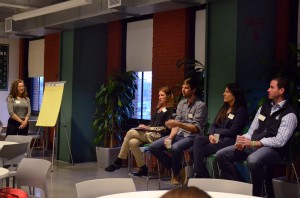
Sustainability organization Greenovate Boston held a panel at Atlantic Wharf on Tuesday to talk about upcycling and recycling, initiatives central to Greenovate’s push to reduce Boston’s greenhouse gas emissions 25 percent by 2025.
The panel featured four Boston-area entrepreneurs as they talked about their upcycling ventures to a crowd of about 25 people. Upcycling is the process of converting waste materials into better-quality products.
“Upcycling and the whole idea of what happens to our waste is something that is fascinating for me as well as a lot of other people,” said panel moderator Charles Zhu, sustainability advisor at Greenovate Boston. “We just wanted to bring some of the innovative experts around Boston that are working around this issue to talk about what this looks like and what it could look like going into the future.”
Panelists were entrepreneurs Brad McNamara, Julie Shane, Ross Lohr and Brooke Nash, who is the branch chief of municipal waste reduction at the Massachusetts Department of Environmental production.
McNamara founded his company Freight Farms to create hydroponic farms using upcycled shipping containers. During the panel, McNamara stressed the importance of localized food production.
“We started to look at the urban landscape and what was already available, and we realized that there were shipping containers everywhere,” he said. “We investigated that further and further and realized that there were shipping containers…not just in the urban environment that could be used for growing localized food.”
Shane’s company Causes International focuses on upcycling discarded electrical and electronic devices, cashing in the obsolete materials to fund charities.
“I founded a company that would create sufficient, sustainable practices that could possibly impact the carbon footprint, but at the same time give people a way to create funding and give back,” she said.
Shane said in 2012, 9 million tons of electronic waste was produced. At the panel, she encouraged citizens not to dump, but rather donate their “e-waste.”
Lohr, whose company, Project RePAT, weaves discarded shirts into quilts, said 2 billion shirts are distributed in the United States each year, requiring 700 gallons of water to produce one t-shirt. He emphasized the importance of consuming less and purchasing clothing second hand.
“The average American throws out 65 pounds of textiles every single year, and 5 percent of material waste on Earth is textiles,” he said. “This is a way for people to take t-shirts out of their closets and make something new.”
Since 2012, Project RePAT has produced over 35,000 quilts from more than 600,000 t-shirts and created 30 full time jobs in the United States, Lohr said.
Nash said 40 percent of the garbage produced in Massachusetts is recyclable.
“What we need to do in Massachusetts, especially Boston, is look to our West Coast neighbors, like San Francisco, where they are recycling 70 percent of their waste,” she said.
Zhu said the main message he wanted attendees to take away was to be more thoughtful and open-minded about upcycling and sustainability.
“All of the panelists had their ending statements, which talked about how people just need to be thoughtful as they go through daily life,” he said. “They should try new things and have an open mind, but it comes down to the individual and the consumer and what that person decides or doesn’t decide to do on a daily basis.”
Attendees said they were inspired to consider their own sustainability practices after leaving the panel.
“I learned a lot about the breadth of activities going on in the area of upcycling,” said Gillian Isabelle, 48, of Newton. “I wasn’t aware of all of the different things that were happening. I agree with what one of the panelists said about producing too much and needing to cut our consumption, so it was nice to see people tackling these issues.”
David Wean, 56, of Roslindale, said it was interesting to learn from experts who have been in the recycling and upcycling business for a long time.
“I walked out of this thinking that the key is finding the money either in incentives – for example, the pay-by-the-bag trash collection urges people to recycle – or subsidies from electronics manufacturers to help pay for the cost of recycling,” he said.
Wean said though upcycling is an important sustainability tool, Massachusetts residents still need to improve their recycling habits.
“I understand what upcycling is, but I’m still trying to make sure that more people actually recycle,” he said. “As we’ve been taught for years, reducing the inputs is probably more important than handling the outputs and packaging.”






















































































































